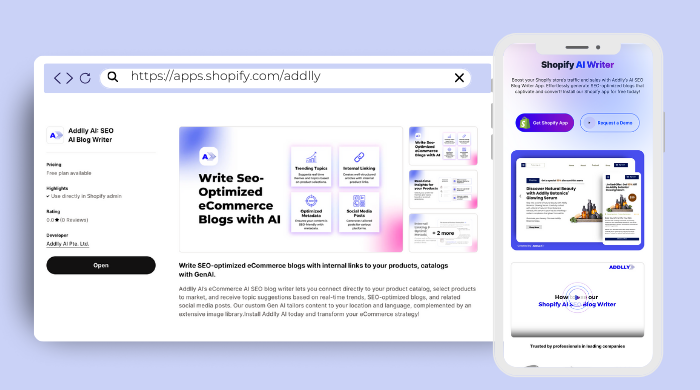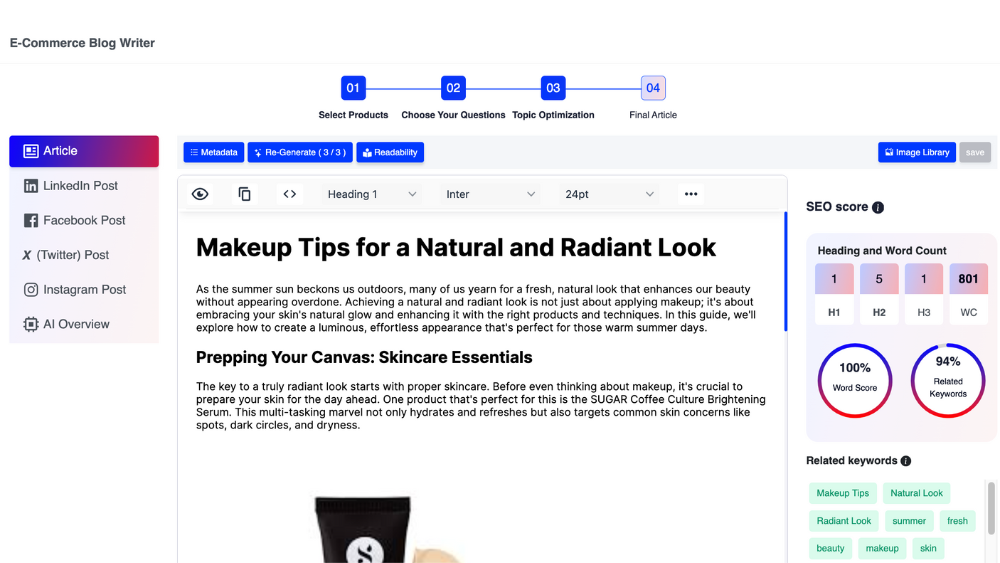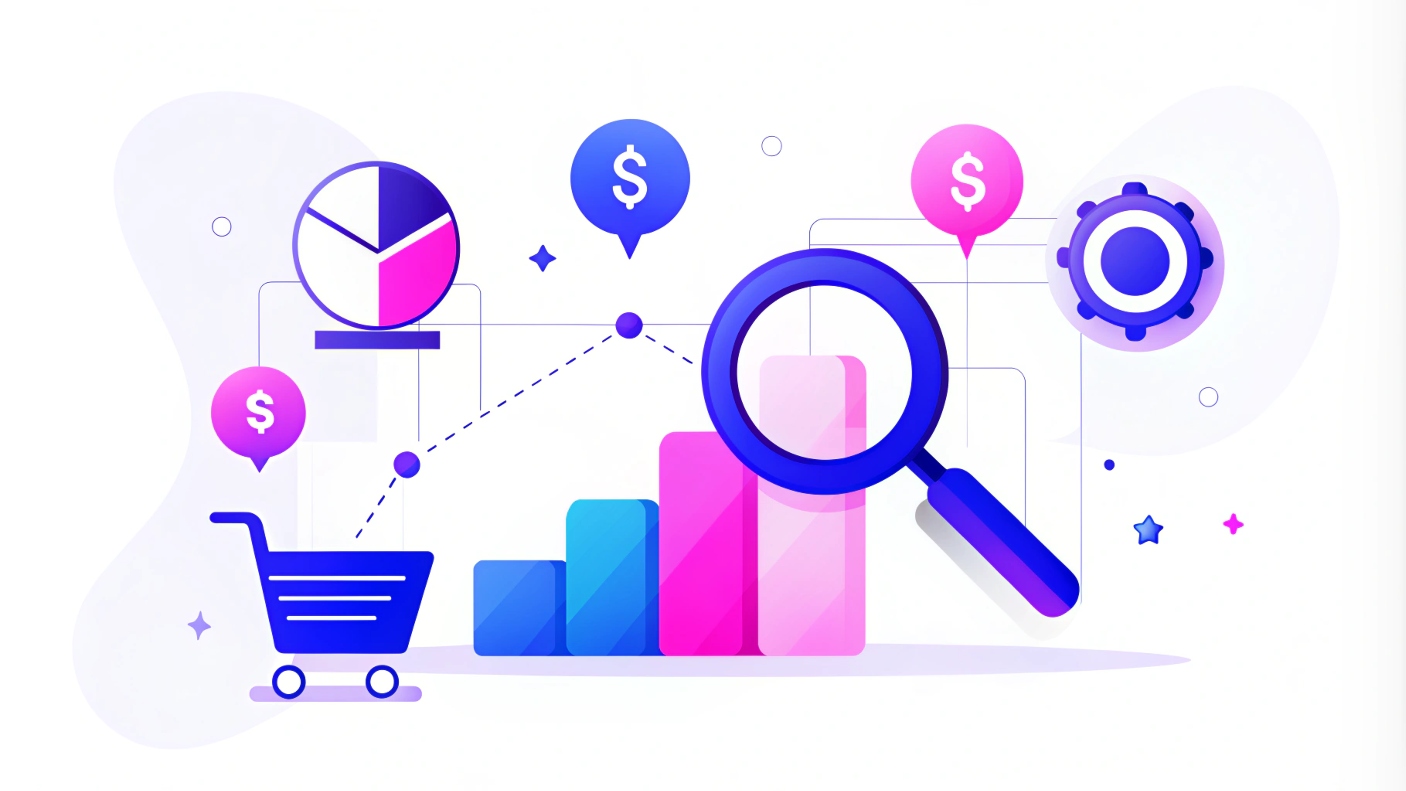With global ecommerce sales projected to reach $8 trillion by 2027 (Statista), businesses must adopt effective strategies to capture their share of this lucrative market.
One of the most powerful tools at their disposal is Search Engine Optimization (SEO). This article delves into the importance of SEO for ecommerce growth, exploring its benefits, best practices, and how it can significantly impact your online store’s success.
1. Increased Visibility and Organic Traffic
The primary goal of SEO is to improve your website’s visibility in search engine results pages (SERPs). When potential customers search for products or services related to your business, you want your online store to appear on the first page. Studies show that a significant majority of users click on one of the top five results, making it imperative to optimize your site effectively.
How SEO Helps:
- Keyword Optimization: By identifying and targeting relevant keywords, you can align your product pages with what your customers are searching for.
- On-Page SEO: Optimizing meta tags, headings, and content can enhance your site’s relevance and boost rankings.
Pro tip:

With the help of Addlly’s Shopify AI Writer, you can create a wealth of content that attracts visitors and encourages them to explore your offerings. One of the standout features of the Addlly Shopify AI Writer is its ability to provide intelligent keyword suggestions. Keywords are the backbone of SEO, and selecting the right ones can significantly impact your site’s visibility in search engine results. The tool analyzes search trends and identifies keywords that are relevant to your products and industry, allowing you to optimize your content effectively.
By incorporating these keywords into your product descriptions and blog posts, you can improve your chances of ranking higher in search results. This means more organic traffic to your site, as potential customers searching for those keywords are more likely to discover your store. The Addlly AI Writer not only helps you find the right keywords but also seamlessly integrates them into your content, ensuring that it reads naturally and remains engaging.

2. Cost-Effective Marketing
Unlike paid advertising, which can drain your budget quickly, SEO is a cost-effective long-term strategy. While it may take time to see results, the investment you make in optimizing your site can yield substantial returns.
How SEO Helps:
- Sustainable Results: Investing in cost-effective marketing strategies, such as SEO and content marketing, can lead to long-term cost savings. Unlike paid advertising, which requires ongoing investment to maintain visibility, well-optimized content can continue to attract organic traffic over time. Once your site ranks well, you can enjoy a steady stream of visitors without the need for continual ad spend, allowing you to allocate your budget to other growth initiatives.
- Higher ROI: SEO often leads to higher conversion rates compared to paid advertising. Users tend to trust organic search results more than paid ads, viewing them as more credible and relevant. This trust translates into a greater likelihood of making a purchase. When your site ranks well for relevant keywords, you attract visitors who are actively searching for products like yours, which increases the chances of conversion. Additionally, the cost-effectiveness of SEO means that the return on investment (ROI) can be significantly higher over time, as you are not continually paying for clicks or impressions.
Pro tip: Addlly complements your SEO strategy by aiding in the creation of high-quality, engaging content that attracts and retains visitors. By focusing on producing valuable content, you can enhance your organic reach while managing your marketing budget effectively.
3. Enhanced User Experience
Search engines prioritize websites that offer a positive user experience. Factors such as site speed, mobile-friendliness, and intuitive navigation all play crucial roles in your SEO ranking. How SEO Helps:
- Improved Site Structure: By optimizing your website’s architecture, you make it easier for users to find what they’re looking for.
- Mobile Optimization: With more users shopping on mobile devices, ensuring your site is mobile-friendly is essential for both SEO and user experience.
Pro tip: With Addlly Shopify AI Writer, you can generate high-quality content that engages users and keeps them on your site longer. By providing valuable information and a seamless shopping experience, you can improve bounce rates and increase the likelihood of conversions.
4. Building Credibility and Trust
When your ecommerce site appears at the top of search results, it conveys authority and trustworthiness. Consumers are more likely to purchase from brands they perceive as credible. How SEO Helps:
- Quality Content: Producing informative and valuable content establishes your brand as an expert in your niche.
- Backlinking: Earning backlinks from reputable sites can significantly enhance your site’s authority.
Pro tip: With Addlly’s SEO-focused content generation, you can create authoritative blog posts and articles that showcase your expertise. This not only helps with SEO but also builds trust with your audience, encouraging them to choose your products over competitors.
5. Increased Conversion Rates
Effective SEO doesn’t just drive traffic; it also leads to higher conversion rates. When your site appears for relevant searches, it attracts users who are already interested in what you offer. How SEO Helps:
- Targeted Traffic: By optimizing for specific keywords, you attract visitors who are more likely to convert.
- Engaging Content: High-quality content can drive users through the sales funnel more effectively.
Pro tip: Addlly helps you craft persuasive product descriptions and engaging blog content that resonates with your target audience. By addressing their needs and pain points, you can guide them towards making a purchase, ultimately increasing your conversion rates. Engaging blog posts attract awareness, persuasive product descriptions aid consideration, and compelling calls to action encourage decision-making. By providing valuable content at each stage, you enhance customer experience and increase conversion likelihood.
6. Competitive Advantage
In the crowded ecommerce space, having a solid SEO strategy can set you apart from your competitors. Many businesses still overlook the importance of SEO, giving you an opportunity to capitalize on the gap.How SEO Helps:
- Market Research: Analyzing competitors’ keywords and strategies can provide insights into gaps you can exploit.
- Long-Term Growth: A well-optimized site can maintain its position even as new competitors enter the market.
Pro tip: Using Addlly, you can stay ahead of the competition by continuously optimizing your content based on SEO best practices. Its insights can help you identify trending keywords and topics, ensuring you remain relevant in your niche.
7. Insights and Analytics
One of the most valuable aspects of SEO is the data it provides. By analyzing traffic patterns, user behavior, and conversion rates, you can make informed decisions to enhance your ecommerce strategy. How SEO Helps:
- Performance Tracking: Tools like Google Analytics allow you to monitor your site’s performance and identify areas for improvement.
- User Insights: Understanding what your customers are searching for can help you tailor your offerings better.
Pro tip: Shopify provides over 60 pre-built reports tailored specifically for ecommerce, allowing you to discover your next steps with confidence. These reports cover various aspects of your business, from sales trends to customer behavior, enabling you to make data-driven decisions that enhance your marketing strategies and product offerings.
Tools and Resources for Ecommerce SEO
To effectively implement SEO strategies, ecommerce businesses can leverage various tools and resources:
1. Google Analytics
Google Analytics is a powerful tool that provides insights into website traffic, user behavior, and conversion rates. By analyzing this data, businesses can make informed decisions to improve their SEO efforts.
2. Keyword Research Tools
Tools like SEMrush, Ahrefs, and Google Keyword Planner can help identify relevant keywords and analyze competitors’ strategies. This information is invaluable for crafting an effective SEO plan.
3. SEO Plugins
For ecommerce platforms like Shopify, utilizing SEO plugins can simplify the optimization process. These tools can help manage metadata, generate sitemaps, and monitor site performance. You can read our blog on how to find the right Shopify apps for your store.
Boost Your Ecommerce SEO with Addlly AI

Addlly AI offers an innovative solution that allows you to create SEO-optimized blogs tailored to your products and audience. With its powerful features, you can enhance your online presence and connect directly with your customers.
Why Use Addlly AI for Your Ecommerce Content?
Addlly AI is designed specifically for ecommerce businesses, enabling you to generate high-quality, SEO-optimized blog content that resonates with your target audience. Here’s how it can transform your content strategy:
1. Trending Topics
Addlly AI suggests themes and topics based on your selected products, ensuring that your content remains relevant and engaging. By focusing on trending topics, you can attract more visitors to your site and keep your audience informed about the latest trends in your niche.
2. Product Selection
With Addlly, you can select up to five products to feature in your articles. This allows you to create targeted content that highlights your offerings, making it easier for customers to discover and purchase your products. Internal links to these products enhance the user experience and improve your site’s SEO.
3. Customization Options
Addlly AI allows you to customize the AI model, tone, and language to match your brand’s voice. Whether you want a formal tone or a more casual approach, Addlly can adapt to your preferences, ensuring that your content aligns with your brand identity.
4. Internal Linking
One of the standout features of Addlly is its ability to create well-structured articles with internal product links. This not only helps search engines understand the relationship between your content but also guides customers to relevant products, increasing the likelihood of conversions.
5. Social Media Posts
In addition to blog content, Addlly generates tailored social media posts for various platforms. This feature allows you to promote your products effectively across different channels, driving traffic back to your ecommerce store.
How Addlly AI Works
Using Addlly AI is straightforward. Here’s a quick overview of the process:
- Connect to Your Product Catalog: Integrate Addlly with your ecommerce platform to access your product catalog seamlessly.
- Select Products: Choose up to five products you want to feature in your blog posts.
- Receive Topic Suggestions: Get real-time topic suggestions based on current trends and your selected products.
- Generate Content: Create SEO-optimized articles that include internal links to your products, enhancing both user experience and search engine visibility.
- Share on Social Media: Use the generated social media posts to promote your content and products across various platforms.
Conclusion
In conclusion, SEO is a vital component of ecommerce growth. By optimizing your online store for search engines, you can increase organic traffic, enhance user experience, and build brand authority. Implementing best practices such as optimizing product pages, utilizing metadata, and creating quality content can significantly impact your success.As the ecommerce landscape continues to evolve, businesses that prioritize SEO will be better positioned to thrive. Additionally, tools like Addlly can further enhance your growth by optimizing upselling strategies. Embrace the power of SEO and watch your ecommerce business flourish in the competitive online marketplace.
Author
-
As an SEO Marketing Specialist at Addlly.ai, my expertise lies in optimizing online visibility through strategic keyword integration and engaging content creation. My approach is holistic, blending advanced SEO techniques with compelling storytelling to enhance brand presence. A true SEO nerd at heart, you'll often find me frequenting the latest SEO blogs, devouring industry insights and soaking up the latest news.
View all posts


